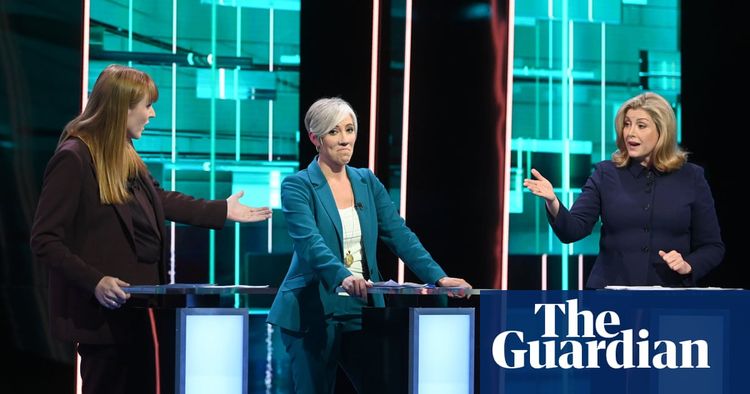Rayner and Mordaunt clash again in heated seven-way TV debate

Angela Rayner and Penny Mordaunt have engaged in a second television debate with other representatives from smaller parties also participating. During the debate, these smaller party representatives launched criticisms against Labour. It appears that Labour may be headed towards taking control of the government.
The deputy leader of Labour Party faced repeated interruptions from Mordaunt, who is the leader of the Commons. Mordaunt accused Labour of wanting to increase taxes and claimed that they have no plans regarding the economy. These interruptions happened while the deputy leader was talking about public services and the economy.
Mordaunt made a comment saying that Rayner had plenty of time to think of ideas, as it has been 14 years. Rayner replied sarcastically, prompting laughter from the audience, that Mordaunt has also had 14 years while in government.
The pair participated in a debate with the same group of people as the initial seven-person debate that was shown on BBC One. This group included Daisy Cooper, who is the deputy leader of the Liberal Democrats, Nigel Farage, who leads the Reform UK party, Stephen Flynn, who is the Westminster leader of the Scottish National Party, Carla Denyer, who co-leads the Greens, and Rhun ap Iorwerth, who is the leader of Plaid Cymru.
Similar to the previous discussion that occurred less than 7 days ago, the significant amount of individuals present caused the happenings to be slightly disorganized. This was due to the speakers interrupting each other and vying for speaking opportunities.
However, certain patterns became evident, such as Labour receiving some level of disapproval from various groups, while Farage directed his criticisms on the Conservative party.
During a discussion on healthcare and other communal facilities, Flynn indicated that if Labour was elected in the future, they would implement cuts that would amount to £18bn in the public sector.
He criticized Labour's strategy of utilizing excess private healthcare resources to reduce waiting lists, which was also condemned by ap Iorwerth.
Denyer briefed on how the Greens intend to gather funds by imposing taxes on wealth and other fees on the more affluent individuals. Subsequently, Rayner was inquired by Denyer on why Labour wouldn't follow the Greens' footsteps. Rayner was questioned on why Labour wasn't bold enough to implement such measures.
Rayner chuckled in response, saying, "No one has ever accused me of being timid."
During a part of the discussion, when every one of the seven speakers had a chance to ask a question to one fellow member, Rayner was approached by Mordaunt, Denyer, Flynn, and ap Iorwerth with their inquiries.
During a political discussion, Farage, Cooper, and Rayner all posed questions to Mordaunt. Cooper's party has their sights on winning many Conservative seats. Mordaunt was asked by the deputy leader of the Labour party if she would be open to Farage joining the Conservative party. Mordaunt did not provide a clear response.
Mordaunt and Rayner had multiple discussions regarding tax and expenditures. The Conservative minister continuously brought up the highly scrutinized assertion that Labour's proposed expenditures would result in families paying an additional £2,000 in taxes.
Mordaunt was insistent that the plans made by Labour contained a gap in their finances that required attention.
She insisted that the sole solution for them to accomplish that objective is to increase taxes. According to her, they have only revealed a portion of the taxes they intend to impose. However, she firmly believes that they have to impose a substantial amount more.
Rayner challenged the concept and on a few occasions, when Mordaunt persistently attempted to broach the topic of taxation, a few members of the audience chuckled.
The Conservative spokesperson faced another uncomfortable situation when they made a comment that caused people to laugh. They claimed that schools in England were of excellent quality and had a global reputation.
As an apparent indication of decreasing backing for the Tories, Flynn garnered obvious approval from the audience with his reply to Mordaunt's comment that individuals cannot bear the expenses of a Labour government. Flynn countered by stating that individuals can no longer bear to have a Conservative government that is entirely detached from reality even for a single day.
Farage, on his side, initiated the discussion by referring to a latest YouGov survey that indicates Reform UK is slightly ahead of the Conservatives, and mentioned: "We have now become the primary rival to Labour."
He kept redirecting the discussion on public services to the topic of immigration, stressing that the Conservative government's gain of 6 million people has caused immense strain to all our public services. He strongly believes that it's an insurmountable task to keep up with the growing population.
He also held accountable the rise in school class sizes on what he called "a rapidly increasing population". In response, Rayner pointed out that the number of students in many schools is actually decreasing.
Flynn criticized the current state of affairs in Westminster during a vote requested by the host, Julie Etchingham. Rayner, Mordaunt, Cooper, and Farage all expressed their desire for lowered migration, which Flynn opposed.
He further expressed that instead of accusing immigrants for causing financial hardship to the citizens of Britain, it would be more justifiable if Farage would acknowledge the adverse impact of Brexit, which was his personal interest, on the economy.

































































